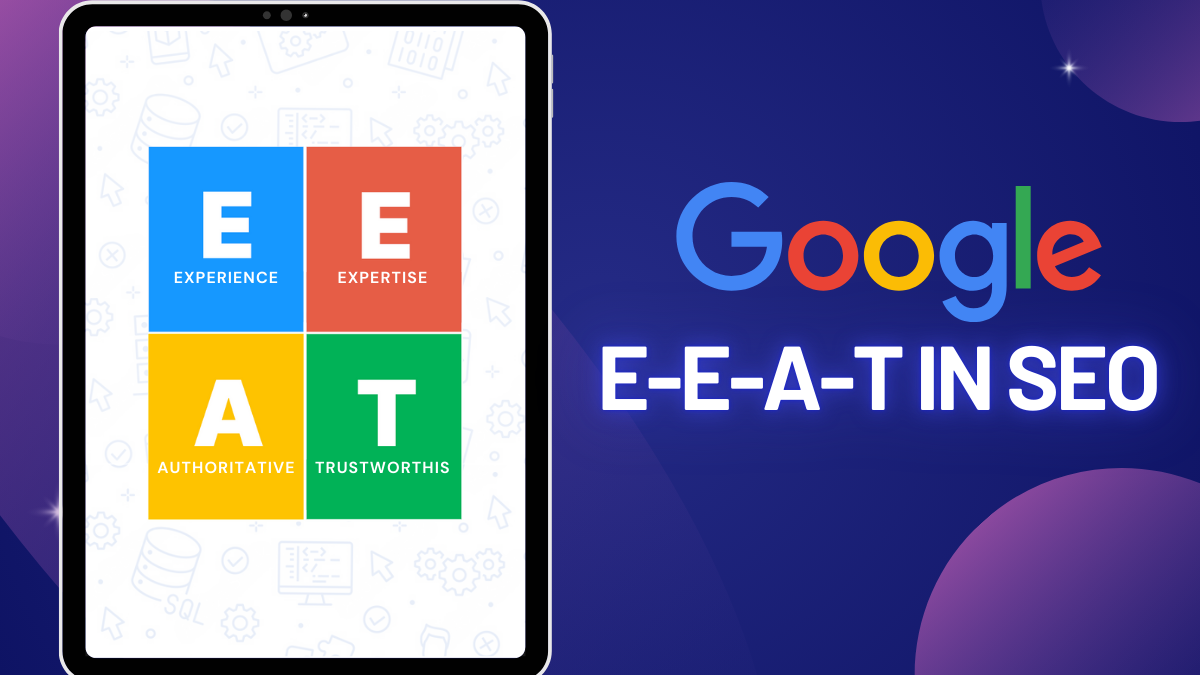Google’s E-E-A-T guidelines are very important for deciding how content is judged and placed in search results. E-E-A-T is part of Google’s rules for judging search quality. It highlights how important it is to have good content that helps users and is trustworthy.
It’s important for businesses and content creators to understand and follow these rules to do well in a tough online environment and meet Google’s goal of providing useful and relevant search results.
By following E-E-A-T principles, websites can get more attention, build user trust, and boost overall interaction. In this post, we will learn what is Google E-E-A-T in SEO and the tips to follow these guidelines.
What is Google E-E-A-T in SEO?
Google E-E-A-T means Experience, Expertise, Authoritativeness, and Trustworthiness. It is a way to judge how good web content is. E-E-A-T, introduced in Google’s Search Quality Evaluator Guidelines, highlights the need for good content that satisfies users and builds trust.
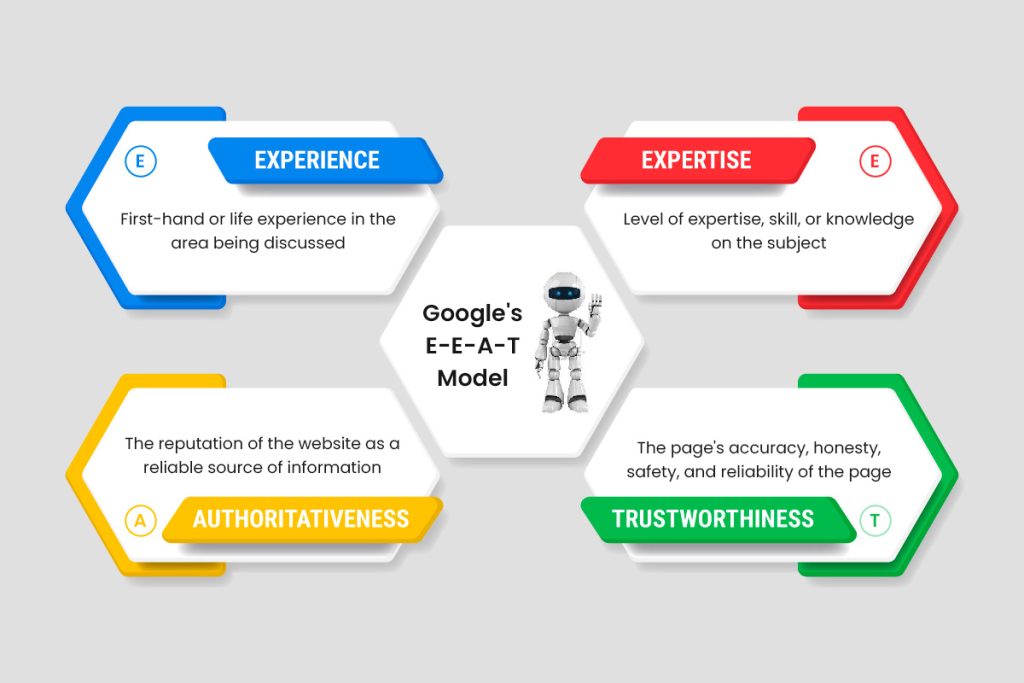
Hiring expert SEO services is crucial for effectively implementing E-E-A-T guidelines, as they ensure your website meets Google’s standards for experience, expertise, authoritativeness, and trustworthiness, ultimately improving your search rankings and online credibility.
Experience means that the creator has personal knowledge about the topic, while Expertise shows their qualifications and how much they know. Authoritativeness looks at how well-respected a website and its authors are in their area of expertise, showing how trustworthy and influential they are. Trustworthiness is about how dependable the information is, which means being clear and correct.
E-E-A-T is very important for YMYL (Your Money or Your Life) topics, since spreading false information can seriously affect people. By following E-E-A-T rules, content creators can become more trustworthy, gain users’ confidence, and get higher positions in search results. This is important for SEO strategies.
Experience (Real-Life Experience)
Google values direct or real-life experiences the most. This is like someone actually trying out a topic, product, or service. For example, Google likes websites made by people who have a lot of experience in fitness because they have been in the field for many years.
Expertise (Deep Knowledge)
It’s about having a strong understanding and experience in a specific subject. Imagine receiving cooking advice from a chef. Google searches for websites made by experts who know a lot about their subject. You can also add things like awards, degrees, author information, and certificates.
Authoritativeness (Reliable Source of Information)
It’s like getting tips from a trusted gym or yoga teacher, or proving that you know what you’re talking about. Google prefers websites that are popular and reliable in a particular community. These places are well-regarded. To build your reputation, get links from good websites, show your qualifications, and connect with other people to prove your skills.
Trustworthiness (Websites with Credible Sources)
Just like you trust a good friend, Google wants websites that are honest, clear, and trustworthy. It looks for reliable and trustworthy sources to provide accurate information consistently. You can gain trust by telling people if there are any biases in your content or if you have paid links.
When you search, Google looks for websites that have good E-E-A-T. This way, you get reliable advice from people or places that know a lot about their field, are trustworthy, and have done well in the past.
Guidelines for Google’s Search Quality Rater
The Search Quality Rater Guidelines is a manual for about 16,000 workers for Google from different countries. These workers check and evaluate search results online. Quality Raters look at and score the quality of websites and search results based on how well they follow Google’s standards for E-E-A-T and how well they answer what the user is searching for.
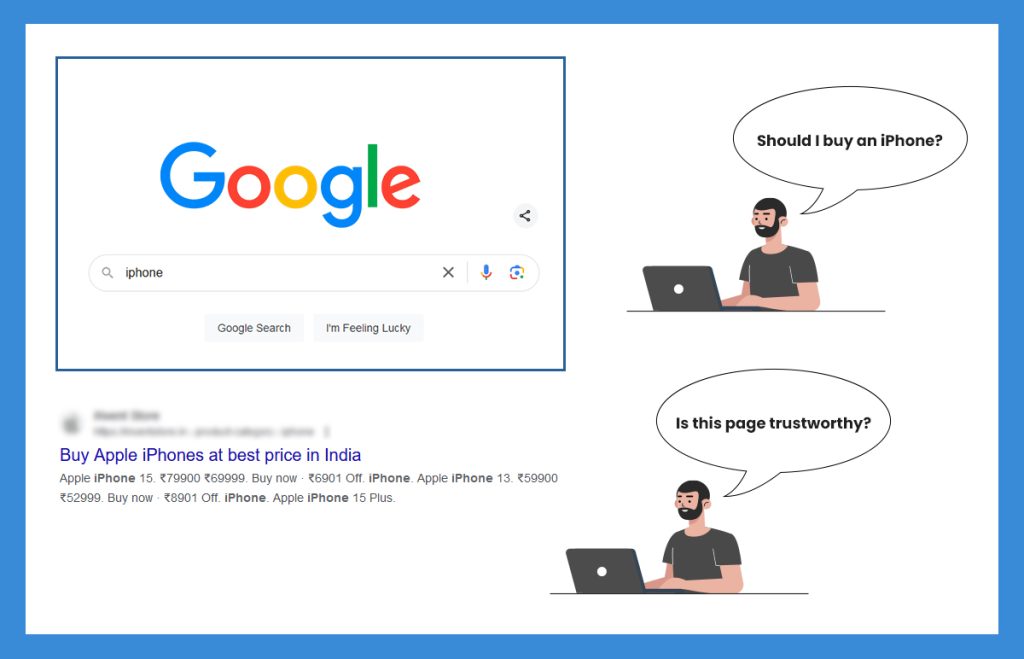
For example, someone can be thinking about whether to trust a website to buy a product. This is where Search Quality Raters help by giving feedback about how good the website is.
The comments from these raters help Google make its system better and give more useful search results. It’s important to remember that quality raters do not directly affect how websites are ranked. Instead, their reviews help give feedback and ideas that influence Google’s ranking system.
Importance of Google E-E-A-T in SEO
Better User Experience
E-E-A-T is important for SEO because it helps improve the experience for users. Websites that have these features offer helpful information that connects with users, encouraging them to interact and stay loyal.
When people trust a website, they are more likely to come back, which brings more visitors and helps the site rank better. E-E-A-T shows search engines that a website is trustworthy, which helps it show up higher in search results.
By focusing on providing good information and trustworthy sources, websites can keep visitors from leaving quickly and help them spend more time on their pages. Having a good E-E-A-T helps improve search engine rankings and builds a good online reputation, leading to long-term growth for businesses.
Algorithm Updates Resistance
E-E-A-T helps websites stay stable even when search engines change their algorithms. Search engines often change how they work to make it easier for users and provide better results.
Websites that show good E-E-A-T are more likely to keep their rankings when changes happen because people see them as trustworthy sources of information. By focusing on content that shows real knowledge and experience, websites earn trust and credibility from both visitors and search engines.
This strength means that even when algorithms change, strong E-E-A-T rules will keep a website visible, helping it adapt and succeed in a changing online environment.
Improved Search Result Positions
E-E-A-T is very important for getting better rankings in search results. Search engines focus on good quality content that shows these traits because they want to give users the best and most trustworthy information.
Websites that show real knowledge and skill are more likely to be positively rated by search engines, which helps them appear higher in search results. When a website is seen as reliable and credible, it gets more visitors from search engines.
This leads to more people staying on the site and fewer leaving quickly. When users engage positively with the content, it shows search engines that the content is good, which helps improve its ranking. Good E-E-A-T helps you get noticed more and gives you an advantage over others in the busy online market.
Brand Growth Over Time
E-E-A-T factors are very important for helping a brand grow over time. By creating a strong system that follows E-E-A-T, brands can make content that connects with users and builds lasting relationships.
Good, reliable content makes using a site better, which leads to more people getting involved and staying loyal. When people see a brand as smart and trustworthy, they are more likely to tell others about it, leading to natural growth through recommendations and people coming back.
Search engines help brands that have strong E-E-A-T profiles by making them rank higher, which means more people will see them. This ongoing visibility in search results not only brings in new customers but also strengthens the brand’s reputation, which helps achieve lasting success and stability in the competitive online market.
More Trust and Reliability
E-E-A-T is important for making a website more trusted and reliable for both people and search engines. When a website regularly shows knowledge with good, researched articles, it becomes a trusted source in its area.
This sense of trust makes people believe the information is reliable, which increases how much they interact with it and share it with others. Search engines notice this trustworthiness, which helps improve rankings in search results.
As a website improves its E-E-A-T profile, it gets more links from other trustworthy sites, which makes it look more credible. In a time when there is a lot of information available, focusing on E-E-A-T is important for businesses that want to be different and build trust with their customers.
Increased Conversion Rates
E-E-A-T is very important for getting more people to take action in SEO. When people see information that shows real knowledge and trustworthiness, they are more likely to trust the brand and feel good about their buying choices.
Good, helpful content meets what users need and improves their overall experience, making them less unsure during important times when they’re about to buy something. As E-E-A-T gets better, websites can connect more with their audience, which helps build stronger relationships and keeps people coming back.
Also, search engines give higher rankings to websites that have strong E-E-A-T profiles, making them more visible and bringing in more visitors who are interested in what they offer. When people trust you and can see what you’re doing, it helps you get more conversions and grow your business steadily.
Also Read: Google’s Update E-A-T — How it Affects Your Industry (and What to do about it)!
E-E-A-T Guidelines
Google’s guidelines for checking quality say that trust is built by demonstrating knowledge, skill, and reliability. E-E-A-T guidelines look at different parts of a website, like:
- Figuring out who created the content or owns the website
- Looking into the E-E-A-T of content makers
- Evaluating how good the pages and content are
- Finding good content and bad content
- Finding important E-E-A-T needs for certain kinds of websites or pages, like YMYL sites
- Looking at how the experience of a phone is different from that of a computer
- Finding possible ways that page designs or usability problems could harm users
- Rate domains and pages on a scale from “Fully Meets User Needs” to “Does Not Meet User Needs”
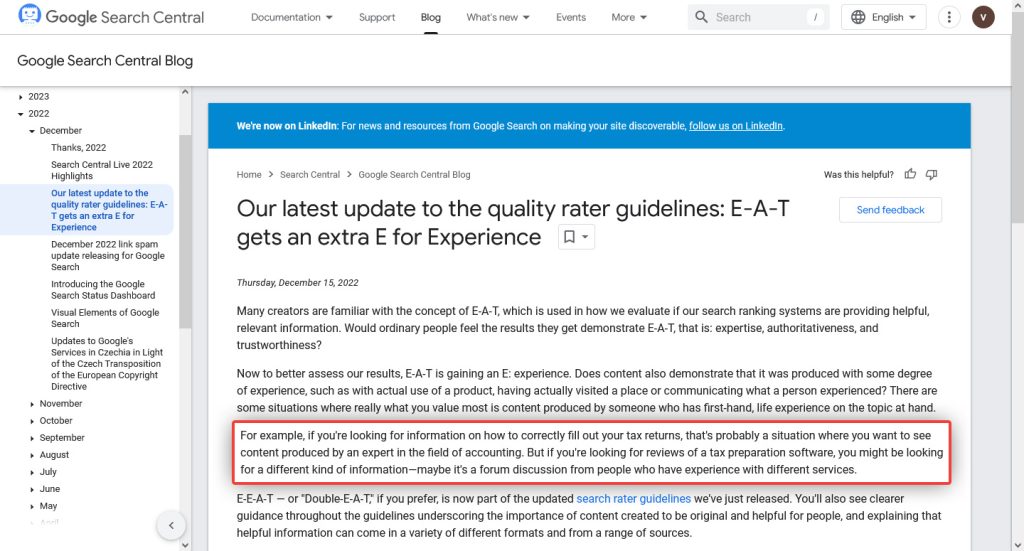
Google shows a good example of this in the Google Search Central Blog. It suggests that if you’re looking for tax information, you should look for content created by someone who is an expert in accounting. If you need specific information about real estate, it’s best to check a website run by real estate experts that offers up-to-date and reliable details.
7 Trusted Tips for Success with Google’s E-E-A-T Guidelines
Target Queries of User
To find the right query, we need to look up which words and phrases people use when they search for something. An estimated number of searches each month and how competitive the phrase is.
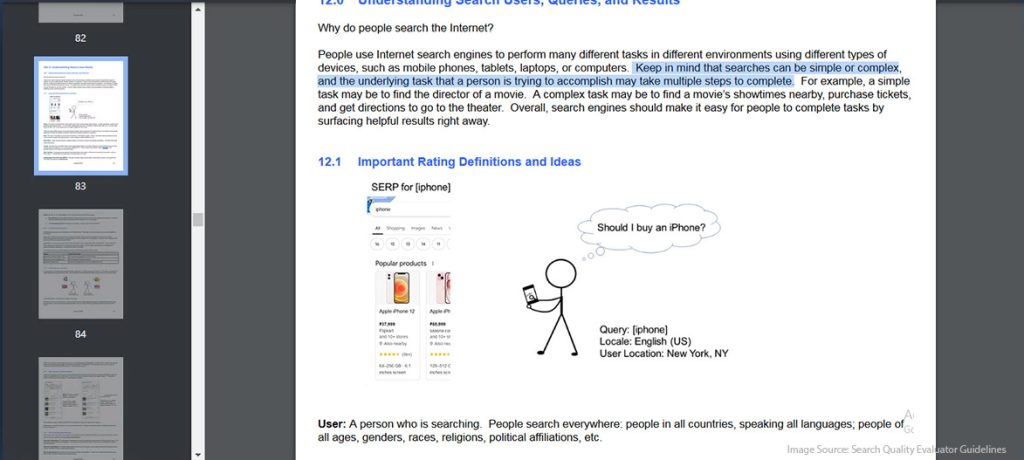
Include important keywords, phrases, and common topics that people often look for information about. Improve your SEO by including reliable and current information from trusted experts. Use these keywords naturally in your content to help people find your website more easily.
Organize your information so it answers questions clearly and simply. When you make your content match what people are searching for, you not only build trust and expertise, but you also have a good chance of ranking higher in search results and getting more people interested.
Make Your Content Up to Date
Google prefers websites that have fresh, original, and good-quality main content. Google content should be enjoyable for people who visit the page. Make sure you have a plan to regularly create new E-E-A-T content for your site and update the old content.
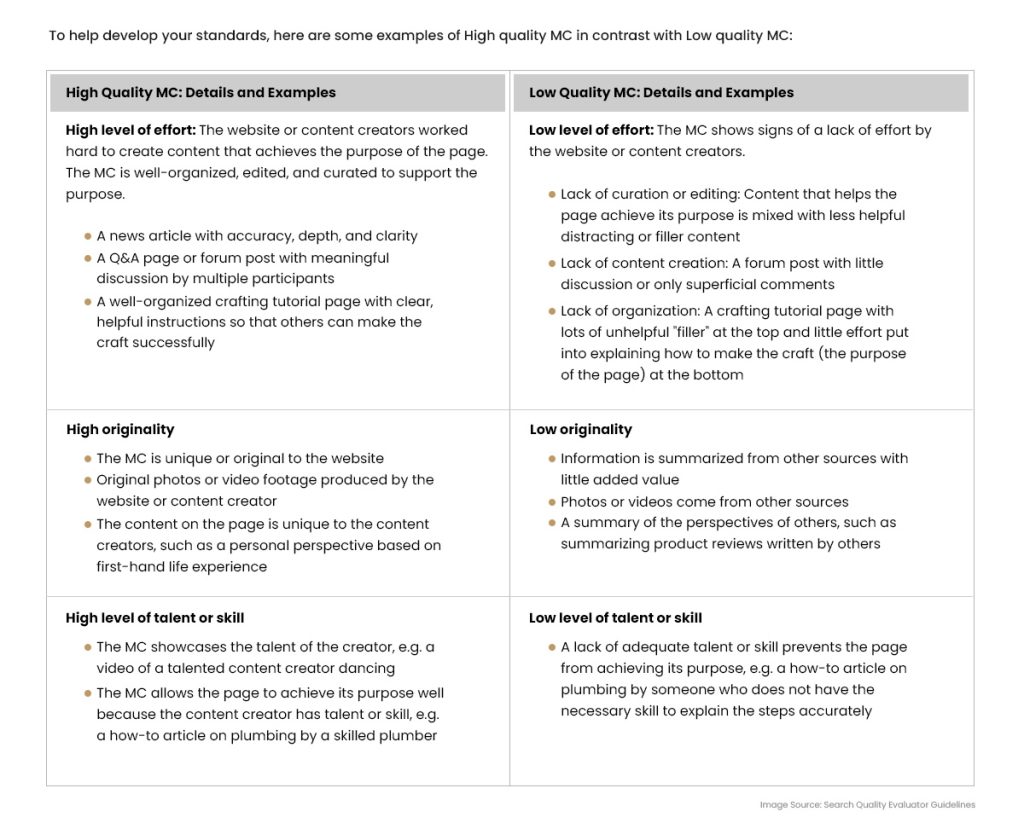
Good E-E-A-T content in SEO shows that people put in hard work, creativity, talent, or skill. If you’re not sure if the content is good, look for similar pages to help you decide. Pages that are average on a topic usually have medium quality.
Frequently updating your articles helps keep the information correct, especially in fast-changing areas like health, technology, and finance. Old content can make your site seem less trustworthy and less important, which might hurt how well it ranks in search results.
Look for any new information, statistics, or trends that should be added to your articles. Also, when you update your content, try to include recent information or quotes from experts to show that you know what you’re talking about.
Understand User Behavior
Focus on giving your visitors helpful answers to their questions and a great experience. The meaning of words can change over time. Google tracks what visitors do on your page and includes that information in its search results.
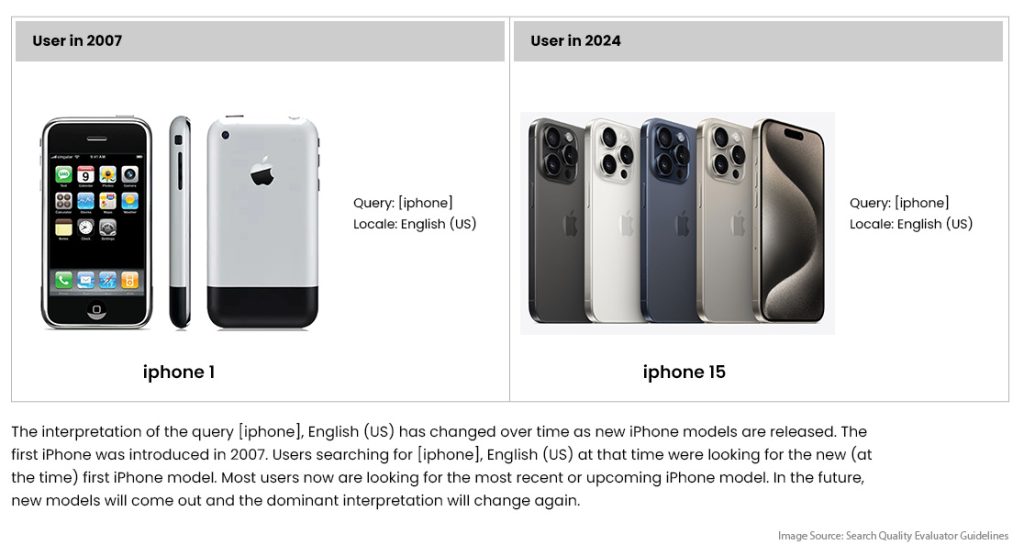
Do visitors leave quickly? Do they stay a while? Do they look at more pages? You need to understand what visitors want when they come to your site. Begin by looking at how people use your content with tools like Google Analytics and heatmaps.
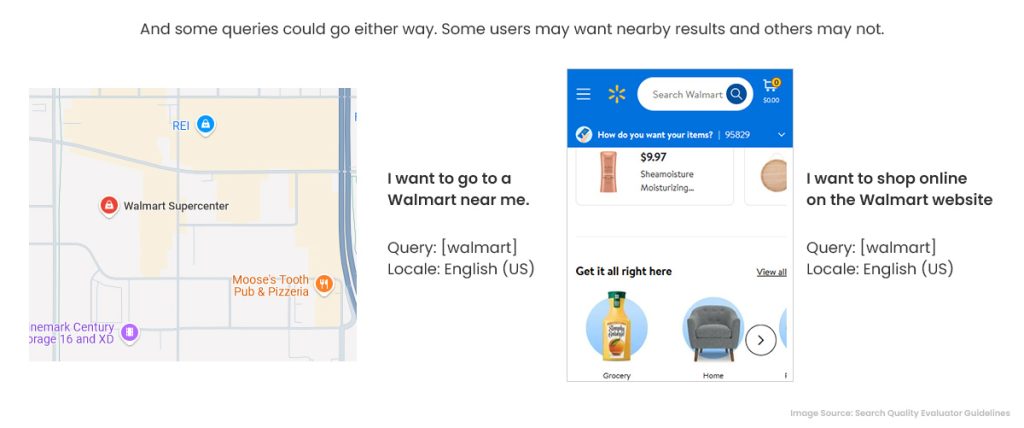
These tools can show you patterns in how users are engaged, when they leave without taking action, and how long they stay on each page. Also, look at the search terms that bring people to your website.
This information helps you meet what users want and need better. Talking to your audience through surveys, social media, or comments can give you helpful information about what they like and what worries them.
E-E-A-T for YMYL
E-E-A-T is very important for YMYL pages, which stands for “Your Money or Your Life”. YMYL includes topics that can affect a person’s future happiness, health, money situation, or safety.
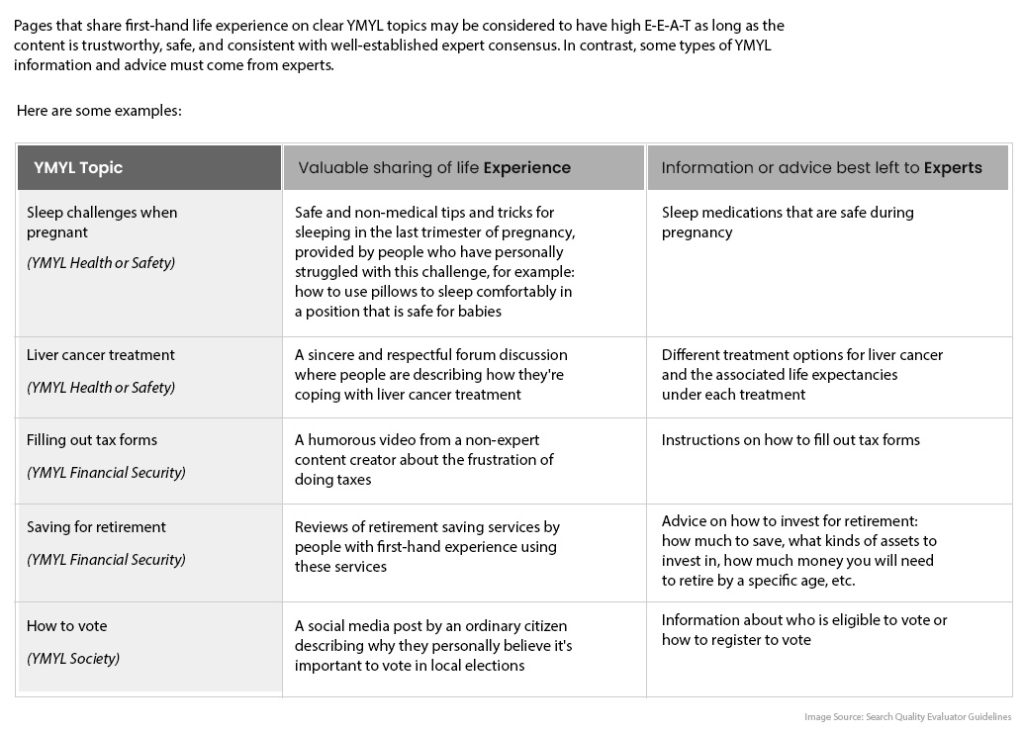
To succeed in this area, make sure your content is made by skilled professionals who have the right qualifications and show they know what they’re talking about. Show clear author profiles that mainly explain their skills, experience, and links to respected organizations.
Focus on giving clear and reliable information and mention trustworthy sources to build trust. Keep your information up to date to show the latest changes and rules. Old information can spread wrong ideas and make users trust you less. Working with trusted experts for their quotes or recommendations can make your content more credible.
About Us Page
The guidelines for checking website quality state that it’s important to clearly show who is in charge of your website. In other words, who owns the site. An “About Us” page is a good way to show this.
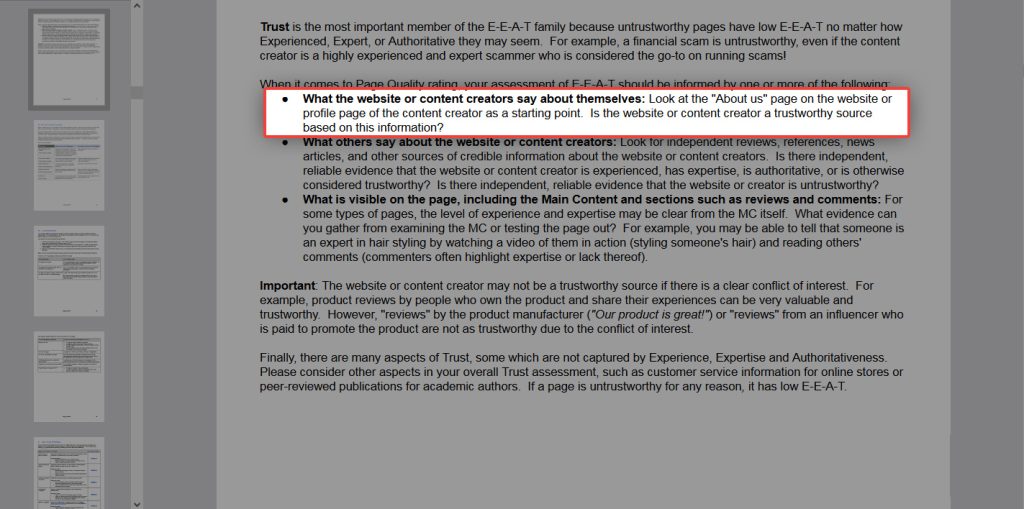
- Who manages the business or website?
- What skills and training do they have?
- What is the story behind your brand?
- Why should people trust you? Have you received any awards?
Begin by clearly stating what your business stands for, what it believes in, and why it exists. This will help you build a strong connection with your audience. Add short profiles of important team members, showing their skills, experience, and what they do in the company.
You should also think about sharing your company’s story and any important achievements or certifications you have. This helps show that you are knowledgeable in your area. Adding reviews or examples of past work can help prove you are trustworthy.
Add On-Site Reviews
Do you show user reviews on your website? This can help gain trust from users and search engines. You can also get reviews from other websites like Trustpilot. Reviews are very important for online shopping.

Customer reviews show other people what others think about your product or service. This helps build trust because it shows that people are happy with it. Ask users to share their thoughts on your products or services, and make sure to show these reviews clearly on important pages.
For software and service websites, case studies can provide more detail. If you don’t have a plan for getting client reviews, it’s a good idea to create one and start asking for more recommendations.
Replying to reviews, whether good or bad, shows that you care about your customers and want to engage with them. This can help improve your reputation. By adding real reviews from users, you make people trust your site more.
Also Read: How To Do Competitor Backlinks Analysis To Rank #1 on Google
Get Quality Backlinks
Do you provide a link to the original source when you mention a statistic or fact on your website? We mean the first source, not just a report that talks about it. This makes users sure that your information is correct and verified.
Get a link to your website from another website that gets a lot of visitors and has customers like yours. Work on a project to create a good blog on their website that links to yours, and get rid of bad backlinks. Try to connect with trustworthy websites and influential people in your area.
When these reliable sources link to your content, it shows Google that your information is good and valuable. To get these links, make good, easy-to-share content like detailed articles, infographics, or original research that people in your field will want to use.
Final Thoughts
Google’s E-E-A-T guidelines are important for anyone who wants to boost their online visibility and improve their search rankings. By paying attention to Experience, Expertise, Authority, and Trust, content creators and website owners can make great content that fulfills user needs and builds trust in their areas of interest.
Following these rules helps create trust with users and search engines, which leads to better visibility and more interaction. As the online world keeps changing, knowing and using E-E-A-T principles will be very important for businesses that want to succeed in tough markets.
Focusing on good content and a positive user experience not only improves a website’s reputation but also helps it grow and succeed over time. E-E-A-T isn’t just about satisfying search engines, it’s about building a loyal audience and providing real value. This will help you benefit in the long run in the constantly changing online search world.
FAQs
What does having expertise mean in E-E-A-T?
Expertise is developed by having the right qualifications, education, experience, and understanding of the subject. This could mean degrees, certificates, or awards that show you are very skilled in the topic. It’s important to include this information in author bios or in the content, as it helps to reassure readers that you are knowledgeable. Also, sharing your research or writing for well-known magazines can make people see you as more knowledgeable.
How can I show that I have authoritativeness?
Having authoritativeness means having a good reputation in your area of work. You can do this by getting links from other trustworthy websites. Talking to your audience on social media, answering questions in online forums, and joining industry conversations can help you get noticed and build your reputation. Also, showing support from others, sharing positive feedback, and mentioning well-known groups you work with can boost your credibility.
Does E-E-A-T matter for all kinds of websites?
Yes, E-E-A-T is important for all kinds of websites, but how important it is can change based on the type of content. For example, E-E-A-T is very important for YMYL topics like health, finance, and legal information because wrong information can seriously affect people. Even websites that aren’t about important topics can improve by following good E-E-A-T practices. This helps build trust with users and boosts their search rankings.
How frequently does Google change its E-E-A-T guidelines?
Google changes its rules from time to time, but the main ideas of E-E-A-T mostly stay the same. These updates are usually part of bigger changes to the system that help make search results better. Although the way we say things might vary, our goal of providing reliable, good-quality content that satisfies what users want stays the same. It’s important to keep up with Google’s changes and adjust your content plans to follow the best practices.
How does Google assess E-E-A-T?
Google checks E-E-A-T using its Search Quality Evaluator Guidelines. These guidelines use real people to judge how good web pages are by following certain criteria. These reviewers check things like how accurate the information is, the authors’ qualifications, the site’s trustworthiness, and how good the experience is for users. These evaluations don’t directly affect rankings, but they help us understand what Google thinks is good quality content. The information from these evaluations helps Google improve its algorithms to focus on content that meets E-E-A-T standards.
